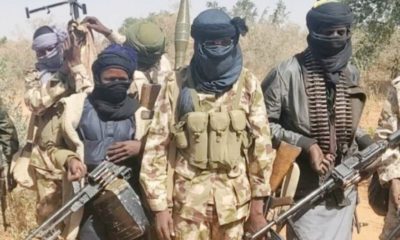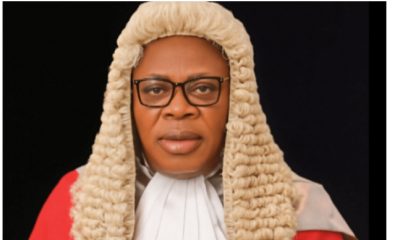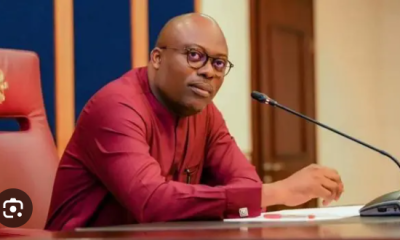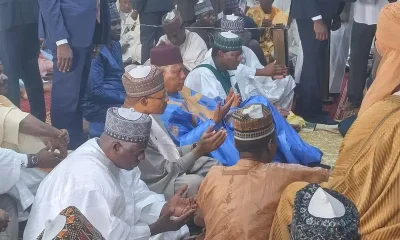News
‘Why Kaduna Is Vulnerable To Attacks Despite Military Presence’
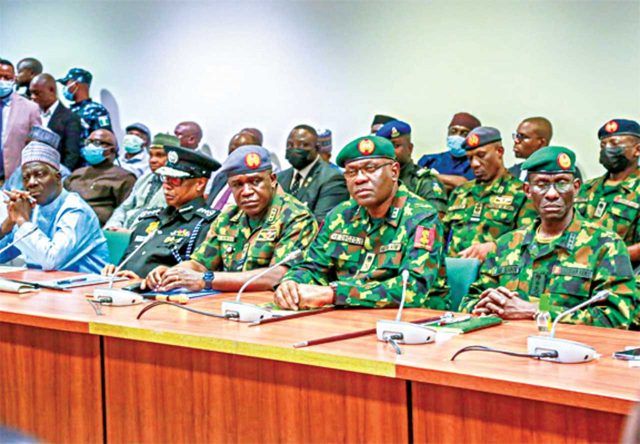
• Terrorists raid military base, kill 17 soldiers in Kaduna
• Reps, Amaechi, service chiefs meet, pledge to turn tide on insecurity
• Nigeria bleeding, says Tinubu
• Army: We’re reviewing security architecture to bridge gaps, build troops’ resolve
Members of the National Assembly, yesterday, resumed plenary, placing last week’s terrorist attack on a Kaduna-bound train on the front burner. While the leadership of the House of Representatives held a closed-door meeting with service chiefs over recent upsurge in insecurity across the country, the Senate once again urged President Muhammadu Buhari to as a matter of urgency declare a full-fledged war on terrorists.
Just as the lawmakers were engaged in a marathon meeting with service chiefs, the military base at Pole Wire in Birnin-Gwari, Kaduna State, was attacked by terrorists who killed no fewer than 17 soldiers and three civilians during a fierce gun battle.
Experts in the security sector have identified key reasons military bases in Northeast and Northwest have suffered frequent attacks by terrorists. If the presence of military institutions were to guarantee peace, safety and protection, Kaduna State would have emerged as the most peaceful and protected entity in Nigeria. Kaduna is blessed with not only elite military establishments but is also home to the largest number of respectable military institutions, making the state the envy of other parts of Nigeria.
Unlike other states with the presence of one military base, a police command and a few security outfits, Kaduna has no fewer than 13 military establishments spread across the state. These are not mean institutions, and are manned by many top officials.
But one is left to wonder how one state managed to be so blessed with such a large number of elite military agencies, with both intimidating artillery weapons and infantry personnel with global battlefield medals, is battered by bandits.
A security analyst, Mr Christopher Oji, said: “Terrorists see soldiers as enemies and as their enemies, they are the first target, so they are vulnerable to attack.
“Secondly, soldiers are seen as the most formidable security agency and once they are able to subdue the military, then the country belongs to them.
“I will want to believe that terrorists have infiltrated the military to the extent that the enemies within are giving out their colleagues to the terrorists. This is where the government has its own blame.
“How can the government conscript some repentant terrorists into the army? These people don’t repent. The government should do something drastic to avert more damages.”
Another security expert, Frank Oshanugo, said: “The vulnerability of military bases to bandits or terrorists’ attacks could stem from two things, one of which is that since the military is the only institution that has what it takes to thwart whatever jihadist intentions the terrorists or bandits have, the best thing to do, is to weaken the powers of the military through such attacks.
“The second reason may be insider conspiracy by those who may be benefitting from the effects of such attacks. Each time bandits or terrorists strike leaving some damages behind, there are usually those who are charged with the responsibility of replacing those damaged items at government expenses. They may be benefitting heavily in the replacement process.”
Former DSS Director, Dennis Amachree, wondered aloud: “Why military bases? I think the question will be, why Kaduna, because the city has a concentration of more than eight military and security facilities. The terrorists feel very emboldened and are making a serious statement about their capability to take on the Nigerian military by hitting Kaduna.
I still maintain that there is more than meets the eyes.”
AT the military base at Pole Wire in Birnin-Gwari, where terrorists killed at least 17 soldiers, locals said terrorists, in large number, came to the area on motorbikes, wielding dangerous weapons, including Rocket Propelled Guns (RPGs).
A source said 17 soldiers were killed in the attack. “About 40 fatally wounded soldiers were brought to the 44 Army Reference Hospital, Kaduna, from where 17 of them were confirmed dead,” he said.
Another source in Birnin Gwari said apart from the soldiers, three civilians were killed. “The two civilians were members of a vigilance group, while one was a traveller,” he said.
Attempts to confirm the casualty figures from military authorities in Kaduna and from the state police command were not successful. However, journalists gathered that the terrorists were moving from Niger State to Zamfara, through their usual route in the Birnin-Gwari area.
“The soldiers were overpowered by the terrorists who came in large number on motorbikes. The terrorists burnt down three military armoured vehicles, stole armaments and other properties,” the source said.
The Birnin-Gwari Emirate Progressive Union (BEPU) had earlier in a statement deplored the deteriorating security situation in many rural communities and major roads of Birnin-Gwari Local Government Area of Kaduna.
Chairman of the union, Ishaq Usman Kasai, said the security situation is becoming increasingly alarming, whereby a large swath of Birnin-Gwari Local Government Area is now at the mercy of marauding bandits who usually roll into towns and villages in convoys of motorcycles, mostly riding three on each, brandishing AK47 rifles, killing and abducting people, including women and children.
“BEPU notes that bandits usually spend hours operating with impunity and unleashing terror, especially in rural communities. The bandits also placed taxes on various communities and keep coming back to attack them because of the absence of law enforcement agents.
“BEPU is also concerned with the activities of Ansaru terrorist organisation, whose members have freely continued to operate, preach and recruit people in various communities. There is, therefore, urgent need for the government and relevant stakeholders to arrest this situation before the area is completely taken by criminals who have continued to challenge national security and sovereignty of Nigeria.”
In the aftermath of increasing incidents of terrorists’ attacks in the last two weeks, the Chief of Army Staff (COAS), Lt. Gen Faruk Yahaya, has reiterated the resolve of the army to deal with all adversaries terrorising the peace of the country.
The COAS said the Nigerian Army is reviewing the security architecture of the country with a view to bridging observed gaps and are building the fighting will of troops. Gen. Yahaya made this known at the opening of a seminar on Intensifying Warriors Ethos in Abuja, yesterday.
The COAS, who was represented by the Chief of Policy and Plans, Major General Anthony Omozojie, stated that varied acts of insurgency, terrorism, kidnapping and banditry from Boko Haram Terrorists, Islamic States of West Africa (ISWAP), to Indigenous People of Biafra (IPOB), ECN and other terrorist organisations have continued to pose substantial threats to the nation even as he insisted that ‘the Nigerian Army has continued to respond assiduously to contain and decimate all adversaries in line with his vision to defeat all adversaries of Nigeria.”
He said: “The volatile and complex security emergencies facing the nation have necessitated the continuous review of the National Security Architecture to contain the threats.
“To address these threats, it has become expedient to review the current security architecture and re-strategise to bridge observed gaps, as well as build the right fighting will for the threats,” he stated.
The House of Representatives was last week provoked by the service chiefs’ shunning of its invitation in the aftermath of the deadly attack on the train and another attack on the Kaduna Airport.
A visibly angry Deputy Speaker, Idris Wase, who presided over the plenary, had expressed disappointment with the officials for sending representatives. The lawmakers sent back the representatives of the security heads, insisting their chiefs must appear in person.
The Speaker of the House of Representatives, Femi Gbajabiamila, before going into a closed-door session yesterday, with the Minister for Transportation, Rotimi Amaechi, service chiefs, heads of intelligence agencies and paramilitary heads, said the meeting was to figure out how to rescue Nigeria from the rising level of insecurity and to demand answers about measures being put in place to end the menace.
After over five hours of deliberations, Gbajabiamila, who spoke briefly to newsmen, said the meeting sought to know if there are moles in the military and other security agencies that may have been responsible for the heightening insecurity.
“Gentlemen, we had an extensive deliberation. There are a lot of issues we discussed. Unfortunately, as defence matters, they are not things for public consumption. But I can assure you that there was a lot of collaboration, a lot of ideas came together in terms of how the security agencies can work together and speak with one voice as against several voices.
“For us to have been in there for hours, you must know that we made some good headway and extensive decisions were reached. We read about contract for surveillance on the Kaduna/Abuja train line and the number of passengers on the train. We don’t want twisted records. We want to get the best out of this. Nobody is happy with the situation of things. I was not happy going in but I am happy coming out,” he said.
Those in attendance included Chief of Defence Staff, Gen Lucky Irabor; Chief of Naval Staff, Admiral Awwal Zubairu Gambo; Chief of Air Staff, Air Marshal Isiaka Amao; Director-General National Intelligence Agency (NIA), Ambassador Ahmed Rufa’i Abubakar; Director-General Department of State Services (DSS), Yusuf Magaji Bichi; and Inspector General of Police, Usman Alkali Baba. Others were Director-General Nigerian Airspace Management Agency (NAMA), Capt. Fola Akinkuotu and Director-General, Nigerian Civil Aviation Authority (NCAA), Musa Nuhu.
Former governor of Lagos State, Bola Ahmed Tinubu, said, yesterday, that Nigeria is bleeding as a result of the spate of killings across the country. The National Leader of the All Progressives Congress (APC) urged all and sundry to join hands in the fight against banditry.
Tinubu, who was in Kaduna on a condolence visit over the terror attack on a Kaduna-bound train from Abuja, said: “We are facing the current challenges seriously and we have to do more. Nigeria bleeds on behalf of everybody. We need to fight terrorism with all our energy and whatever we have. It’s not shameful for people to be poor, but it’s unacceptable to accept poverty as a norm.
“It’s shameful to be callous, wicked and be a bully or terror to instill fear in humanity and it’s not acceptable.”
In his response, el-Rufai commended Tinubu for cancelling his 70th-anniversary colloquium as a mark of honour for the victims of the attack.
“This visit preempted my planned visit to Asiwaju to thank him for solidarity with the people of Kaduna for cancelling his colloquium the day it was to take place. This gesture by Asiwaju is a show of powerful leadership, empathy and concern for the lives and property of Nigerians. It’s unprecedented in our history in Nigeria.
“The government and people of Kaduna State will never forget this gesture. We are very grateful to you for the service, sacrifice and commitment to the unity of our country. We appreciate your call for people to contribute to enable us to rehabilitate the victims of this tragedy.
“We are aware of your aspiration to be president of this country, we look forward to further engagement so that we can progress that aspiration,” the governor said.
The Guardian
-

 News4 days ago
News4 days agoRamadan, Lent: Shettima Calls For National Unity And Compassion
-

 Opinion4 days ago
Opinion4 days agoReinventing Osun’s Economy Through Dagbolu Intl. Trade Centre: From Quiet Market Lessons To Regional Trade Revolution By Adeboye Adebayo
-

 News4 days ago
News4 days ago‘Wike Factor’: Another PDP Chairmanship Candidate Steps Down For APC In FCT
-

 News3 days ago
News3 days agoInsecurity: Kogi Schools Resume On Monday



